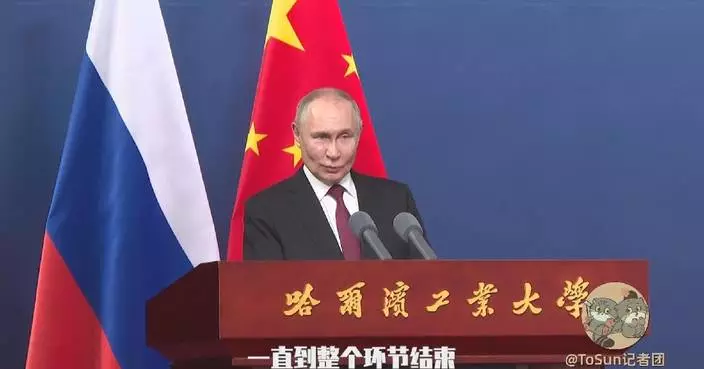Chinese President Xi Jinping's upcoming state visit to France and Hungary will deepen traditional friendships, while promoting development through pragmatic cooperation, said officials from the two European countries.
At the invitation of President Emmanuel Macron of France, President Aleksandar Vucic of Serbia, President Tamas Sulyok and Prime Minister Viktor Orban of Hungary, Chinese President Xi will pay state visits to these three countries from May 5 to 10, Foreign Ministry spokeswoman Hua Chunying announced on Monday.
In interviews with China Central Television (CCTV), two French officials were optimistic of Xi's visit, saying that it plays a pivotal role in promoting multilateralism.
"President Macron had previously met with President Xi Jinping in China. We witnessed the exchanges between the two heads of state and felt the close ties between the two countries. We are eagerly looking forward to President Xi's visit to France," said David Lappartient, president of the French National Olympic and Sports Committee (CNOSF).
"President Xi's visit is very important. At a time when the international situation is becoming more volatile, it is very meaningful for the two heads of states to meet. We only have one Earth, and we must uphold multilateralism, promote cooperation and take concrete actions to build a community with a shared future for mankind," said Patrick Brunot, president of Sino-French Friendship Association in Paris.
The visit takes on added significance as this year marks the 75th anniversary of diplomatic relations between China and Hungary, with Hungary being the first European country to sign a cooperation agreement under China's Belt and Road Initiative.
Two Hungarian officials expressed their expectations for Xi's upcoming visit, highlighting that it could broaden the areas of cooperation between the two sides.
"It's a good occasion to the 75th anniversary, to re-think and re-shape this cooperation and find new areas to develop and make a better position in the world economy. His European visits in France, in Hungary and other countries [are] decisive for the European Union," said Mihaly Varga, Hungarian Minister of Finance.
"China is a large country, a big country, a huge country, a great country. Let's create together, I mean globally, a peaceful and harmonious, and also a developed world," said Gyorgy Matolcsy, Governor of the National Bank of Hungary.

Xi's upcoming state visit to deepen relations with France, Hungary: officials

Xi's upcoming state visit to deepen relations with France, Hungary: officials

Xi's upcoming state visit to deepen relations with France, Hungary: officials
A member with a Japanese think-tank on nuclear energy on Friday condemned the release of nuclear-contaminated water, calling it an irresponsible move taken by the Japanese government and the Tokyo Electric Power Company under a situation that has failed to ensure the safety and reliability.
On the same day, Japan started the sixth round of release of nuclear-contaminated water from the crippled Fukushima Daiichi Nuclear Power Plant into the Pacific Ocean. About 7,800 tons of nuclear-contaminated water are being discharged from about a kilometer off the coast of Fukushima Prefecture via an underwater tunnel until June 4.
In an interview with China Central Television (CCTV), Tamotsu Sugenami, a member of the Japan's Citizens' Commission on Nuclear Energy, stressed that Japan has a responsibility to properly manage the nuclear-contaminated water.
"Japan should shoulder the responsibility for the well management [of nuclear-contaminated wastewater]. However, so far, the Japanese government and the Tokyo Electric Power Company haven't adopted any practical measures to cope with it, which has resulted in the accumulation of a significant amount of nuclear-contaminated water," said Sugenami.
He pointed out that the Japanese government and the Tokyo Electric Power Company have been using a variety of methods to promote the so-called safety of releasing nuclear-contaminated water into the sea, which is deceptive.
"Tritium itself is a radioactive substance. And it is a fact that it cannot be filtered out of the water. Despite the dilution with a large amount of seawater, the discharged water still remains contaminated which is undeniable. The Japanese government calls it 'treated water,' but it's just a change of name. In essence, it is still nuclear-contaminated water," Sugenami said.
Sugenami also noted that the impact from the accident at the Fukushima nuclear plant has been profound even after 13 years. He called on the Japanese government and the Tokyo Electric Power Company to adopt necessary measures to safely advance the settlement of the waste furnace.
"It has been 13 years since the accident occurred at the Fukushima nuclear plant. But much of the waste treatment work of the furnace was temporarily organized. Such a long-term approach to temporarily cope with the water will inevitably lead to various safety incidents. Japan must acknowledge its failure in this regard. And the whole society should recognize its responsibility for the nuclear accident," said Sugenami.
Hit by an earthquake and an ensuing tsunami on March 11, 2011, the Fukushima nuclear plant suffered core meltdowns that released radiation, resulting in a level-7 nuclear accident, the highest on the International Nuclear and Radiological Event Scale.
The plant has been generating a massive amount of water polluted with radioactive substances from cooling down the nuclear fuel in the reactor buildings.

Japanese nuclear energy think-tank condemns nuclear-contaminated water release












